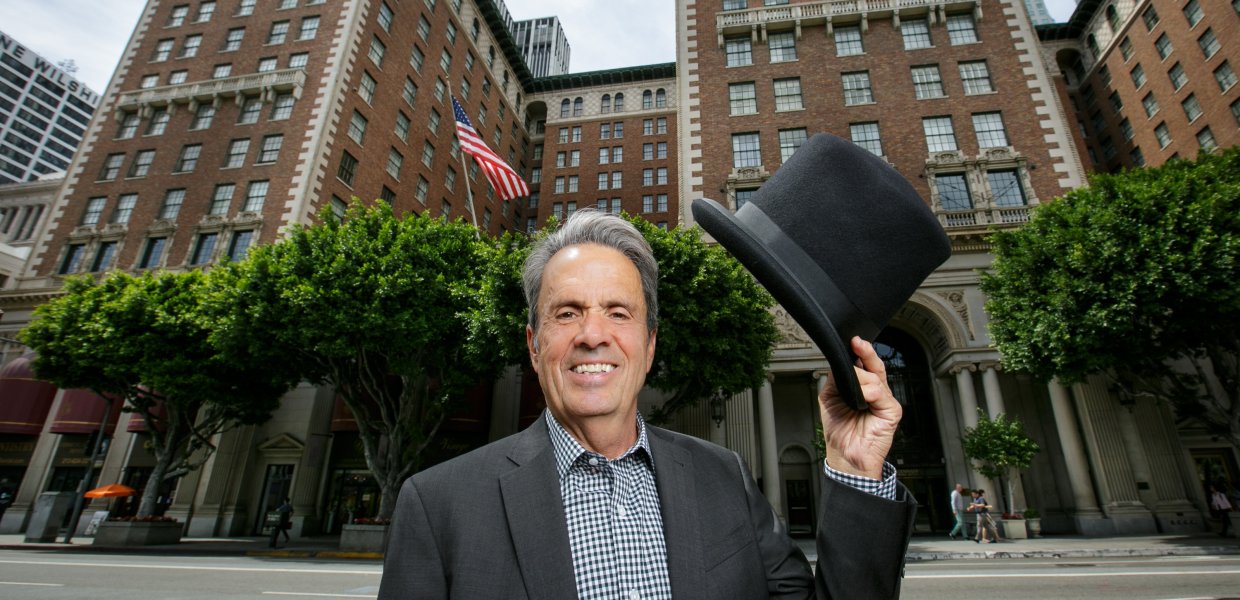Fred Cook has had a lot of jobs.
He’s been a cabin boy on a Norwegian ship, cleaning up after roughly 50 sailors — their beds often covered in grease from the engine room.
He was a doorman at the Biltmore Hotel in Downtown Los Angeles, memorizing guests names off their luggage tags to get extra tips.
He was a substitute teacher in the Los Angeles Unified School District, working in Wilmington, teaching anything they’d assign him — from home economics to auto mechanics.
He rode around Europe on motorcycle. He’s traveled to Syria and Afghanistan.
The chairman and former CEO of public relations firm Golin said it’s those odd jobs and experiences that made him more prepared for his 30-year career in PR – where he’s worked with folks like Apple founder Steve Jobs and Amazon’s Jeff Bezos and launched brands such as Pokemon and the Teenage Mutant Ninja Turtles.
“I think people today are a little afraid to experiment with their lives because they’re afraid they they’re going to miss out on something or they’re going to step off the perfect path to success,” he said. “My goal is teach students to be more creative, more courageous and more curious.”
This semester Cook, director of the USC Annenberg’s Center for Public Relations, taught his first class at USC. Called “Improvisational Leadership,” undergraduate and graduate students ditched tests and papers for something different: experiences.
Here’s a few examples of their assignments, based on Cook’s life.
Expose yourself: Each week, he challenges students to try something new and share it with the class. “I think that it inspires creativity and creates courage when you try things outside your comfort zone,” Cook said.
Graduate student Dana Al Ghusain, 25, decided to go to a bar mitzvah at a synagogue – something new to her as a Palestinian raised in Kuwait. Another week, she went to a dance class hosted by the L.A. Clippers spirit team to challenge her insecurities about her body, she said.
“Fred really makes us really understand the value we bring to the table and he really shows us how taking the risk and failing is way better than not taking the risk at all,” she said.
Johnna Hughes, earning a master’s in strategic public relations, heard about a tattoo artist that does free stick-and-poke tattoos. The catch is, you don’t consult ahead of time: You find out what you’re getting the moment you sit down with him. “I was so nervous I walked out of the store and down the street,” she said upon her visit. A moment later, she went back in and talked to him. She now has a tattoo of a thumbtack on her elbow to show for it.
Some other standouts from these assignment: One student entered a competition and ended up winning $10,000; another had an internship at Paramount Pictures and decided to ask for a full-time job for the week’s exercise – and got it.
Ask the captain: Students are challenged to pick a person who works at a company they’re interested in and reach out to them throughout the semester, ideally culminating with an interview or meeting. The idea is rooted in Cook’s work on the ship. Initially the captain turned him down but he was persistent. “Students today are a little afraid to ask for what they want – but if you don’t ask, you never get anything,” he said.
Work for tips: Inspired by his two-year stint as a doorman at the Biltmore, Cook asks students to approach people in the service and hospitality industry and ask them what gets them better tips. The students compile the advice to shine a light on good customer service – “It’s the little things that count, not the grand gestures,” Cook said. Some examples they’ve found: a hotel leaving a note thanking a guest for posting their visit on Instagram; another hotel left a guest’s phone charger wrapped up with a bow. A waitress offered the advice of telling a customer no by “saying yes,” if the restaurant can’t accommodate them, offer a suggestion that might meet that need.
Both Al Ghusain and Hughes called Cook’s class one of the most practical they took while earning their master’s degrees at USC, saying they feel better prepared for the real world. In other exercises, they had to pitch a startup Shark Tank style, learn how to negotiate a salary and make a physical map of their social network.
“There’s a lot to learn that you can’t quite read in a text book,” Hughes, 24, said. “I think his big point is, one of the biggest strengths workers can have is having an unconventional mindset. It helps differentiate yourself from the competition.”
So, does Cook think resumes should have a “life experience” section?
“Most resumes, people look at for six to seven seconds. Most of them are boring,” he said. “They’ll list at the bottom a line about their life experiences – the languages they speak, the places they’ve been or the hobbies they have. A lot of times I think those are the things that make you most special – the things you’ve done that nobody else has done. … But you have to explain how it’s valuable, what you learned and how it applies to the job you want to do.”
Cook’s class is based on his 2014 book Improvise: Unconventional Career Advice from an Unlikely CEO.
